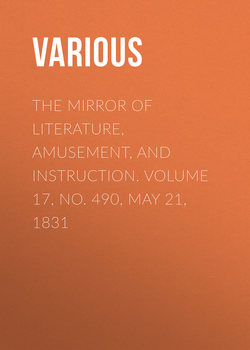Читать книгу The Mirror of Literature, Amusement, and Instruction. Volume 17, No. 490, May 21, 1831 - Various - Страница 2
PARLIAMENT
Оглавление(For the Mirror.)
The following particulars, which have been gleaned from several sources, relating to the British Parliament, may be acceptable at the present time, when the English people are in hopes of a renovation of that Constitution which has been, and will still continue to be, the admiration of the civilized world:—The word Parliament was first used in 1265; and the Commons were admitted at this time, though not regularly represented. The parliament called at Shrewsbury, in 1283, by Edward I., was the first to which cities and towns were summoned to send representatives. It was also the first that granted aids towards the national defence of the three denominations of knights, citizens, and burgesses, as well as by the lords spiritual and temporal. In this parliament the representatives sat in a separate chamber from the barons and knights. The Commons consisted of two knights for each county, two representatives for the city of London, and two for each of the following twenty towns only:—
Winchester, Newcastle-upon-Tyne, York, Bristol, Exeter, Lincoln, Canterbury, Carlisle, Norwich, Northampton, Nottingham, Scarborough, Grimsby, Lynn, Colchester, Yarmouth, Hereford, Chester, Shrewsbury, Worcester.
From this it appears that there were not representatives of any towns in the counties of
Westmoreland, Lancaster, Derby, Durham, Stafford, Warwick, Leicester, Rutland, Suffolk, Hertford, Bedford, Cambridge, Huntingdon, Buckingham, Berks, Oxford, Wilts, Somerset, Gloucester, Dorset, Sussex, Surrey.
In after times, burghs that were summoned frequently prayed the Crown to be excused from sending representatives, on the account of their being compelled to pay 3s. 4d. a day to each member for his maintenance, while attending in his place; yet the allowance was made on a plan so strictly economical, that the knights of Berkshire were only allowed for six days, those for Bedfordshire for only five days, and those for Cornwall for only eleven days, when called to a parliament at York. Sheriffs, in their write for elections to parliament, sometimes omitted one or more burghs in a county, and at other times sent writs to the same burghs—and this, for aught known to the contrary, without instruction from the king or his council. Where burghs were poor, there were many such omissions, by favour of the sheriff, for a space of nearly three hundred years. Upon petition of the town of Torrington to Edward III., in 1366, he directed a letter to the bailiff and good men of the town, excusing them "from the burden of sending two representatives to parliament, as they had never been obliged so to do till the 24th of his reign, when," says the king, "the sheriffs of Devonshire maliciously summoned them to send two members to parliament."
Writs for the election of members to serve in the House of Commons are issued under different authorities upon a general election, and upon vacancies of particular seats during the continuance of a parliament. In the former case, the Lord Chancellor of Great Britain, pursuant to the order in council, causes the writs of elections to be issued for all places in England and Scotland to which such writs are usually sent. By the Articles and Act of Union with Ireland, the Lord Chancellor then, pursuant to the said orders, &c., causes writs to be issued and directed by the Clerk of the Crown in Ireland to the several counties, and such counties of cities and towns as send members to the united parliament.
It is generally supposed that the circumstance of bishops, or other ecclesiastics having seats in the legislature, is peculiar to England. This is a mistake;—it was characteristic of the Scottish constitution for centuries previous to their connexion with England: so far back, indeed, if not much farther, as the twelfth century. It is stated, in ancient documents connected with the history of the county of Elgin, the authenticity of which cannot be doubted, that the Abbey of Kinloss was founded by David I., in January, 1150, and that the abbot was mitred, and had a seat in parliament.
To the passing of a bill, the assent of the knights, citizens, and burgesses must be in person; but the lords may give their votes by proxy; and the reason is, that the barons always sat in parliament in their own right, as part of the pares curtis of the king; and therefore, as they were allowed to serve by proxy in the wars, so had they leave to make proxies in parliament; but the commons coming only as representing the barones minores, and the soccage tenants in the country, and as representing the men of the cities, &c., they could not constitute proxies as representatives of others.
When it is the pleasure of the Crown to dissolve a parliament, it is the constant practice immediately to summon another, and to make the dissolution of the old and the calling of the new simultaneous acts. By the Act of 7 and 8 of William III., c. xxv. s. I, forty days should intervene between the teste and return of the writs for a new parliament; but a longer time is necessary, and fifty days now intervene.
Parliaments became triennial from the reigns of Edward III., but not until 1694 had any act passed to make such duration legal. In 1716 this was repealed, and the present act passed, making them septennial.
W.G.C
